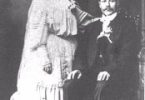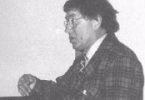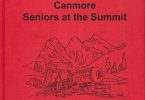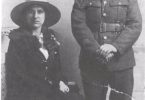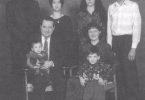Jack complicated the Heath family tree tremendously by marrying Ellen Henesay. Ellen was the daughter of Benjamin’s second wife, Sarah, and so technically, though not blood-related, she was Jack’s step-sister. When Jack and Ellen married, Jack’s father, Benjamin, also became his father-in- law, and his step-mother, Sarah, became his mother-in-law as well. The family relationships became even more confusing when Jack and Ellen had their ten children, who, technically, were also their nieces and nephews!
Except for a scar across his face, Jack was considered pleasant-looking. He had a huge moustache which his grand-daughter, Wilda, remembers him always fiddling with – trying to remove tea which inevitably got in it every time he took a sip. Wilda also remembers he wore a tweed cap at all times, except at the dinner table.
Jack should have been a cat – he seemed to have nine lives. Like his father, as a youth, he had been a miner in Wales. Once, during a cave-in miles underground, a huge boulder crashed down upon Jack’s head. The rock fell on top of him, split his face, and bounced off. Jack recovered from the injury but was left forever marked by the incident. Coal dust had become embedded in the wound and could not be properly cleaned out. As the skin healed, the area around the gash turned blue, and left a scar on Jack’s face which ran across his forehead, over his nose and across his cheek.
On another occasion, Jack and Jack Jr. blasted bedrock with dynamite, in attempts to dig a new well on the family farm. After several months of hard digging, they knew they were nearing the top of the water table. Jack went down the hole to set off a blasting cap. Unfortunately, he had misjudged the length of the fuse attached to the dynamite. When Jack Jr. realized there was a problem, he rushed over to the well and yelled down to his father. Jack’s son scrambled to get him out of the hole before it blew. Still shaking, the two stood and watched as the dynamite exploded and the water began to fill the well. It seems ironic now, and a testament to the harshness of prairie life – after almost losing his life in efforts to develop a new water supply for the farm, the well went dry within two years.
Jack proved conclusively that old habits die hard. As the automobile became an everyday part of life, Jack decided that the family should buy one. Though he learned to drive the car, he never really liked it. However, he realized it could make life much easier – you did not have to feed it every day and there was a whole lot less clean-up than with the horses.
One day, Jack was arriving home from town, frantically pulling back on the steering wheel. His family watched in horror as Jack and his motorcar crashed through the fence, ripped clothes from the clothesline, and smashed into the side of the house. The family ran towards the car just as Jack was getting out. When they asked him what the hell he was doing, Jack replied, “Well, I told her to whoa – but she didn’t whoa!”
Jack was devastated when Ellen died in 1936. Jack Jr. feared he might commit suicide, and never left his father’s side – day or night – for the next eight months, until he felt some degree of acceptance and adjustment was evidenced in his father’s behaviour. Jack never again participated in any of the activities he had loved sharing with Ellen. It must have been too painful a reminder for him To go to the movies or play cards with old family Friends.
Despite constant attempts by Jack Jr. and his wife, Ruby, to get Jack Sr. to come on a holiday, or even a Sunday outing, Jack only left his home twice in all the rest of his life. Once they got him to go visiting at Jimmy’s farm, and another time, he took a day trip to Gap Lake.
As a small girl, one of Wilda’s favorite things to do was going to visit with her grand-dad. As Ruby, Wilda’s mom, did his laundry each week, Wilda had ample opportunity to visit Jack. She does not remember exactly what they talked about but, at the time, she always felt their conversations were very grown-up. In retrospect, however, she’s not so sure, from the amount of giggling she remembers him trying to hide behind his hand and large moustache.
If one of these visits was properly timed, Wilda was always assured of receiving a delicious lunch of sardines on toast, or salmon sandwiches, with strong black tea that had simmered on the stove many hours. As she sat and ate with Jack, they would watch Jack’s many cats be driven into an absolute frenzy by the fishy smells.
Jack loved caraway seed cake. About once a year, for a real treat, Ruby would bake one for him. As it was one of his most prized sweets, he would always try to hide it – especially from his youngest son, Darrel, who still lived at home. On one occasion, he put the cake in the bottom drawer of his bedroom dresser. When he went to sneak a piece several days later, he found it reduced to crumbs. A chipmunk had taken up residency in the attic and after discovering that it, too, had a taste for caraway, made fast work of the cake.
After he retired, Jack took on projects to pass the time. He lived on one of Canmore’s back streets, on the edge of town, by the golf course. Jack became the caretaker for the golf course and ran concessions for the golf tournaments. He also started a beer bottle depot in his back yard.
In Canmore Seniors at the Summit, ed. Canmore Seniors Association, 2000, p. 121-122.


